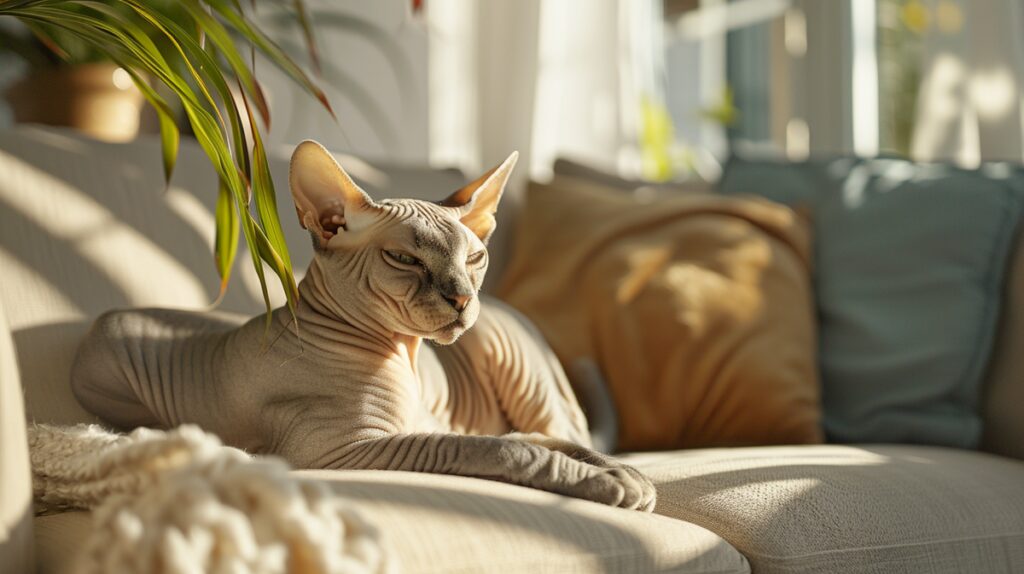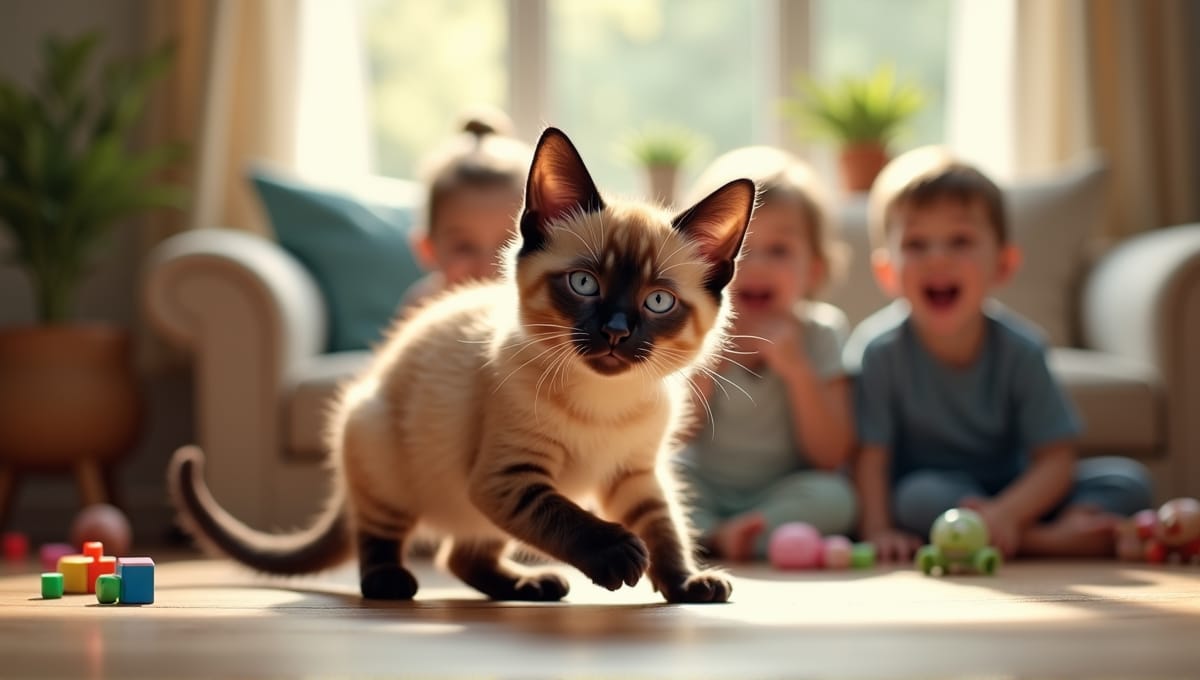I’ve been intrigued by hairless cats ever since I saw one at a special cat show. The Donskoy is an interesting and frequently underrated variety of hairless cat. If you’re thinking about getting one, there’s plenty to learn about these cats.
They have some unique requirements and quirks that distinguish them from other breeds. So, is a Donskoy cat the best choice for you?
Origins and History of the Donskoy Cat
The story of the Donskoy cat began in 1987 in Rostov-on-Don, Russia. I vividly remember the buzz in the cat community when people heard about a special hairless kitten named Varvara. This hairless kitten was the beginning of the Donskoy breed.
Varvara’s owner, Elena Kovaleva, noticed her cat’s distinct lack of hair. She started breeding the cat with local toms, and breeders were shocked when half of the kittens from the litters were born hairless. This surprising discovery caught the attention of cat breeders around the world.
The World Cat Federation officially recognized the Donskoy as a breed in 1987, and The International Cat Association (TICA) followed suit in 2005. These official recognitions cemented the Donskoy’s place in the cat world.
The Donskoy is unique because these hairless cats carry a dominant mutation for hairlessness. This distinguishes them from other hairless breeds, like the Sphynx. With other hairless breeds, it takes two copies of the gene to make a hairless cat. However, with the Donskoy, just a single copy can result in a hairless cat. This genetic oddity has made the Donskoy interesting to both geneticists and cat lovers.
Physical Characteristics of Donskoy Cats

Donskoy cats are truly a unique appearance. Their hairless bodies are surprisingly warm and have a velvety texture. Some people liken it to chamois leather. These cats have muscular medium-sized bodies and long, lean legs.
You can’t miss their large bat ears and prominent cheekbones. Their eyes are almond shaped and can be any color. Donskoy cats have wrinkled skin, especially around their face, muzzle, and neck.
While most Donskoy cats are hairless, there are four different coat types:
- Rubber bald: Hairless with sticky feeling skin at birth
- Flocked: Feels like chamois with very short thin hair
- Velour: Born with a wavy coat that later falls out
- Brush: Wavy coat at birth that later becomes wiry and stays
Not all Donskoy kittens that carry the hairless gene are born bald. Some kittens will initially have hair, but then lose it as they mature into an adult cat. It’s truly remarkable to see this change occur. Interestingly, each cat can change its coat type at different periods in its life, making each cat even more unique.
Donskoy Cat Temperament and Personality
I’ve watched Donskoy cats for many hours, and they are anything but shy. They are social butterflies that love human attention. These cats will follow you around the house while loudly demanding cuddles and playtime. And if they want something, they will certainly let you know.
Donskoy cats are also very bright. You can easily train them to do tricks and even walk on a leash. And because they’re smart, you should give them plenty of mental stimulation. Puzzle toys and other interactive activities are a great choice for these intelligent cats.
In terms of energy levels, Donskoy cats are moderate to high. They love to play, but they also enjoy lounging around in warm areas. They also get along well with kids and other pets, although socializing them early is important to ensure they get along with other cats.
Donskoy cats are also very loyal to their families and not the type of cat to run and hide if guests come over. Instead, they will probably meet new guests with a curiosity that is charming. So, if you want a loyal cat to form strong bonds with, a Donskoy cat is a great bet.
Health Considerations for Donskoy Cats
Caring for a Donskoy cat does come with some unique health considerations. Their lack of fur leaves them susceptible to certain skin problems. Without regular check-ups with a vet that is knowledgeable about hairless breeds you may run into trouble.
There’s controversy surrounding the breeding of Donskoy cats. In 2014, the Netherlands prohibited the breeding of Donskoys due to welfare concerns. The genetic mutation that causes Donskoys to be hairless is the dominant mutation that can also cause feline ectodermal dysplasia in its severe form. This genetic mutation can lead to dental and sweat gland abnormalities.
Despite the controversy, Donskoy cats can be very healthy cats if they receive proper care. On average, they live for 12-15 years, and some live even longer. To keep them healthy, they need to go to the vet regularly for vaccinations, get dental care, and receive other preventive treatments.
Genetic testing is very important for Donskoy breeders, as it keeps you from passing on harmful traits. As a Donskoy cat owner, you should also know about these genetic conditions. Stay educated and work with your vet to keep your Donskoy cat as healthy as possible.
Caring for a Donskoy Cat

Caring for a Donskoy cat requires a bit of work, as their hairless skin requires regular maintenance. Here’s a simple skincare routine you should use:
- Weekly baths with gentle cat-specific shampoo
- Daily wiping with a damp cloth to remove oils
- Regular application of pet-safe moisturizer
- Sunscreen before outdoor playtime
Temperature is a key consideration when caring for a Donskoy cat. They can get quite cold, so make sure they have warm beds and other cozy places to cuddle up. In the summer, they need protection from heat and sunburn, so many owners dress their Donskoy cats in sweaters during the winter.
Skin health largely depends on a Donskoy cats’ diet. Feed them high-quality, protein-packed food to help them maintain healthy skin. Some Donskoy cats may require more calories. They have a faster metabolism than furry breeds, so talk to your vet to discuss the best diet plan.
Grooming tools are also different than what you would use for a furry cat. You’ll need soft cloths, rubber brushes, pet wipes, nail clippers, and ear cleaners.
Donskoy Cats as Pets
Donskoy cats are excellent pets for the right households, as they do well in an environment where they receive a lot of attention. If you want an aloof, independent cat that won’t demand much attention, the Donskoy probably isn’t the best choice.
These cats require daily playtime, mental challenges, and interactive toys, puzzle feeders, and climbing structures are excellent options to keep them busy. You can also train Donskoy cats to do tricks, which is a great way to bond with your cat.
Donskoy cats also adjust well to living exclusively indoors. They are sensitive to very hot and very cold temperatures, so it’s safest to simply keep them inside. However, they enjoy spending time outside under supervision in a secure, enclosed outdoor space.
Keep in mind Donskoy cats live for 15 years or longer. This is a life-long commitment, and you’ll need to continue dedicating time and attention to the Donskoy cat for the rest of his life. If you’re willing to do that, and you want a loving, loyal cat, the Donskoy cat might be a great choice for you.
Acquiring a Donskoy Cat
When shopping for a Donskoy cat, do your research. Look for reputable breeders who prioritize the cat’s health and ethical breeding standards. Donskoy kitten prices range from $500 to $2,500 depending on the cat’s breeding and quality.
When talking with breeders, ask about health testing, genetic screening, and socialization. Also ask to see the kitten’s and parents’ health certificates. If a breeder isn’t transparent, take it as a red flag and find a different cattery.
You might also consider adoption. While it’s less common, some Donskoy cats wind up in shelters or rescue organizations, so you might get lucky and find one that needs a new home.
Before you bring a Donskoy cat home, make sure you’re ready to care for this unusual breed. These cats require unique care, so ensure you can handle their specific needs. If you’re interested in other hairless cat breeds, research the different options to find the best breed for your lifestyle.)
Donskoys are a special breed of hairless cat with an interesting background and specific care requirements. They are excellent and affectionate companions for the right family, thanks to their social behavior, intelligence, and ability to adapt.
However, keep in mind that they are a high-maintenance pet due to their unique skincare routine and environmental quirks. If you’re willing to put in the work and want a cat that sheds very little and is a true conversation starter, the Donskoy could be the ideal pet for you. As always, conduct thorough research and consider adoption if you decide a Donskoy is the right cat for you.






